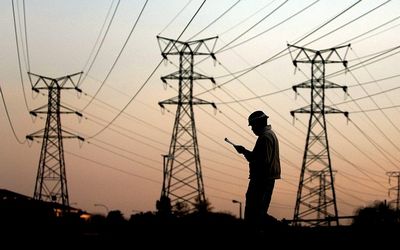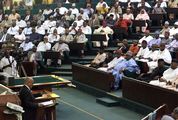MPS TOOK the National Energy Regulator of SA (Nersa) to task on Tuesday, saying the above-inflation tariff increase it granted to electricity utility Eskom last week would hurt poor South Africans.
Nersa was also questioned about Eskom’s extensive use of an open-cycle turbine to bolster the national electricity grid in a bid to avoid load shedding. This resulted in Eskom spending billions of rand on diesel to run the turbine. MPs also queried the preferential pricing offered to mining giant, BHP Billiton.
Nersa granted Eskom a 9.4% tariff hike for 2016-17, and not the 16% increase it had requested.
Inkatha Freedom Party MP Jan Esterhuizen asked the Nersa delegation in Parliament’s energy committee why cash-strapped electricity consumers had to pay the price of Eskom inefficiency. He said that "9.4% cannot be afforded in the current climate of low growth and increasing inflation".
Mr Esterhuizen accused the regulator of ignoring the outcry expressed at public hearings and also questioned why BHP Billiton was paying five times less than the average cost of electricity.
Democratic Alliance MP Pieter van Dalen asked if Nersa had found Eskom to have been "prudent" in incurring cost overruns, and whether the situation would improve once Medupi and Kusile were completed.
He also wanted to know whether Eskom was collecting fines from mines that supplied poor quality coal to its power stations.
Nersa electricity official Thembani Bukula told the committee that had Medupi been commissioned timeously some three years ago, then the diesel-guzzling open cycle turbine would not have been used as much. He said the 9.4% determination for Eskom had been made on the basis of affordability and sustainability. He also said the contracts with BHP Billiton had been negotiated at a time when there was an oversupply of electricity, before 1994. Nersa could not revoke contracts, he said.
While Koeberg nuclear power station did produce the cheapest power in the country, Nersa had not undertaken any modelling of what a nuclear-build programme would do to the cost structure of electricity, Mr Bukula said.

Picture: SUNDAY TIMES
MPS TOOK the National Energy Regulator of SA (Nersa) to task on Tuesday, saying the above-inflation tariff increase it granted to electricity utility Eskom last week would hurt poor South Africans.
Nersa was also questioned about Eskom’s extensive use of an open-cycle turbine to bolster the national electricity grid in a bid to avoid load shedding. This resulted in Eskom spending billions of rand on diesel to run the turbine. MPs also queried the preferential pricing offered to mining giant, BHP Billiton.
Nersa granted Eskom a 9.4% tariff hike for 2016-17, and not the 16% increase it had requested.
Inkatha Freedom Party MP Jan Esterhuizen asked the Nersa delegation in Parliament’s energy committee why cash-strapped electricity consumers had to pay the price of Eskom inefficiency. He said that "9.4% cannot be afforded in the current climate of low growth and increasing inflation".
Mr Esterhuizen accused the regulator of ignoring the outcry expressed at public hearings and also questioned why BHP Billiton was paying five times less than the average cost of electricity.
Democratic Alliance MP Pieter van Dalen asked if Nersa had found Eskom to have been "prudent" in incurring cost overruns, and whether the situation would improve once Medupi and Kusile were completed.
He also wanted to know whether Eskom was collecting fines from mines that supplied poor quality coal to its power stations.
Nersa electricity official Thembani Bukula told the committee that had Medupi been commissioned timeously some three years ago, then the diesel-guzzling open cycle turbine would not have been used as much. He said the 9.4% determination for Eskom had been made on the basis of affordability and sustainability. He also said the contracts with BHP Billiton had been negotiated at a time when there was an oversupply of electricity, before 1994. Nersa could not revoke contracts, he said.
While Koeberg nuclear power station did produce the cheapest power in the country, Nersa had not undertaken any modelling of what a nuclear-build programme would do to the cost structure of electricity, Mr Bukula said.





















Change: -0.22%
Change: -0.35%
Change: -1.57%
Change: -0.10%
Change: 0.39%
Data supplied by Profile Data
Change: -0.34%
Change: 0.21%
Change: -0.22%
Change: 0.00%
Change: 0.51%
Data supplied by Profile Data
Change: 0.07%
Change: 0.05%
Change: -0.18%
Change: 0.07%
Change: 0.00%
Data supplied by Profile Data
Change: -0.38%
Change: -0.10%
Change: 0.00%
Change: -0.88%
Change: -0.76%
Data supplied by Profile Data